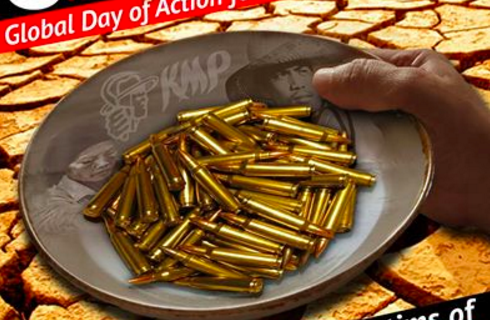Climate violence and the criminalization of hunger
Earlier this week tragic events on the island of Mindao in the Philippines, served as a stark reminder of how climate change and poverty are visiting violence on peasant and indigenous communities across the globe.
After record-breaking temperatures and a months-long drought resulted in massive crop failures, 6,000 desperate peasant farmers and supporters blocked a highway near Kidapawan City in Cotabato province, Their demand? 15,000 sacks of rice from the government disaster relief agency to ease the food crisis. After days of protest, instead of rice, Filipino police and army forces opened fire into the unarmed crowd, killing 10 and wounding over 100, with a further 87 reported missing. Over 40 protesters were arrested and charged.
The country’s most widely read newspaper, The Philippine Star, reported on the event as if it was more of public nuisance than a criminal act of extra-judicial execution. They insinuated there were links between the starving protestors and the New People’s Army, the armed wing of the Filipino Communist Party. The Star declared that farmers were unwilling to dialogue with the governor, and presented government shootings of unarmed civilians as a logical and inevitable result of this intransigence.
The Kidapawan shooting transcends the specifics of this regional drought and localised food protests. It reflects the catastrophic neoliberal intersection of climate change, poverty and state violence. Rather than stepping in with state support, governments and the military worldwide are increasingly deploying political repression and counter-insurgency tactics to crush the growing dissent of peoples not only in climate-affected regions, but also against those losing their homes and territories to the brutal expansion of extractive industries and palm and soy plantations. Following on the heels of the targeted murders of indigenous leader Berta Caceres in Honduras and two Mayan activists in the Peten of Guatemala, the Kidapawan massacre highlights two dangerously related global trends: the criminalization of dissent and decriminalization of extra-judicial executions.
Not all dissent is criminalized equally and not all dissenters risk executions at the hands of the police and military. Indigenous peoples, peasants and people of color suffer disproportionately from environmental disasters and from income and resource inequities, trapping these communities in a vicious cycle of poverty and hunger – a cycle that is exacerbated by climate change. Not only is the gap between the poor and the privileged widening, the levels of violence against the disenfranchised is increasing. When indigenous people come together with the ultimate resource they possess – their collective dissent – they are repeatedly met with violence intended to terrorize them, shatter their unity, weaken their resolve and silence their voice.
The events in the Philippines are a sad example of how peasant and indigenous peoples across the world are struggling for recognition, struggling for their homes and fighting for their lives by demanding “the right to have rights.”
When public dissent is criminalized—and when the police become executioners—it not only robs the lives and voices of the oppressed, it silences democracy for everyone.
Stay in the loop with Food First!
Get our independent analysis, research, and other publications you care about to your inbox for free!
Sign up today!#RiceNotBullets Global Day of Action April 8
Please watch this video about the massacre entitled “Bullets for Rice: the massacre of protesting farmers in Kidapawan” https://www.
Link to the Huffington Post article.


 Help Food First to continue growing an informed, transformative, and flourishing food movement.
Help Food First to continue growing an informed, transformative, and flourishing food movement.




